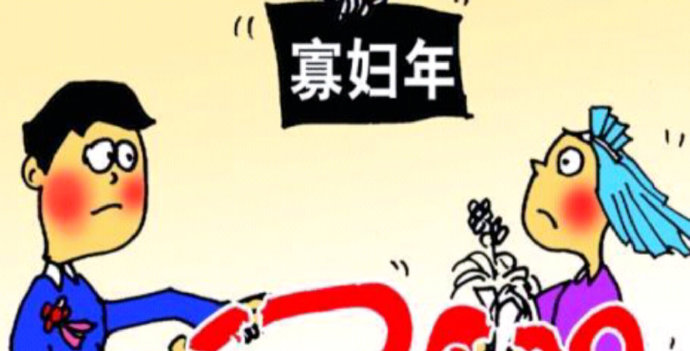Explainer: What is a 'Widow Year' and why some Chinese are wary about it
解说员:什么是“寡妇年”,为什么一些中国人对此持谨慎态度
NEW DELHI: In Chinese culture, certain years are wrapped in superstitions and traditions that have been passed down through generations. Among these is the concept of the "Widow Year," a term that sparks discussions and concerns, especially when it comes to significant life events such as marriage. As the Year of the Dragon approaches, labeled as a Widow Year, many are revisiting the old beliefs and practices associated with this period.
新德里:在中国文化中,某些年份被代代相传的迷信和传统所笼罩。其中包括“寡妇年”的概念,这个词引发了人们的讨论和担忧,尤其是当涉及到婚姻等重大生活事件时。随着被称为寡妇年的龙年的临近,许多人正在重新审视与这一时期相关的古老信仰和习俗。
The upcoming Year of the Dragon is also known as a "Widow Year" in Chinese culture, a period many consider unlucky for marriage.
A Widow Year in China is a lunar year that does not contain the traditional start of spring, known as Lichun. Lichun is one of the 24 solar terms that divide up the lunar year, marking the coming of the spring season. According to some Chinese superstitions, Lichun is a time of yang (masculine) energy, and a year without Lichun is a year without yang energy.
在中国文化中,即将到来的龙年也被称为“寡妇年”,许多人认为这段时间不适合结婚。
寡妇年在中国是指没有传统立春的农历年。立春是划分农历一年的24个节气之一,标志着春季的到来。根据中国的一些迷信,立春是阳气旺盛的时候,没有立春的一年就是没有阳气的一年。

Therefore, the term "Widow Year" (gua fu nian in Chinese) is associated with the superstition that a woman marrying during this time may face the early loss of her husband.
The name "Widow Year" originates from a misunderstanding of the term gua nian, meaning "the year lacking Spring Commences," a vital solar term in ancient Chinese culture symbolizing a blessed year.
The absence of Spring Commences in a Widow Year is interpreted as a lack of masculine energy (yang), reinforcing the superstition surrounding widowhood.
因此,“寡妇年”一词与迷信有关,即在此期间结婚的妇女可能会提前丧夫
“寡妇年”这个名字源于对“寡年”一词的误解,意思是“缺少立春的一年”,这是中国古代文化中一个重要的节气,象征着幸福的一年。
寡妇年没有立春被解释为缺乏阳气,强化了对守寡的迷信。
The Chinese lunisolar calendar, combining lunar months and solar terms, requires the addition of seven leap months every 19 years to align lunar and solar years.
Some lunar years have two instances of Spring Commences, while others, known as Widow Years, have none.
Despite superstitions, historical data shows that Widow Years, like the Year of the Snake in 2013, do not significantly deter marriages.
中国的阴阳历结合了农历月份和节气,要求每19年增加7个闰月,以调整农历和太阳年。
有些农历年份有两个立春,而另一些被称为寡妇年的年份则没有立春。
尽管有迷信,但历史数据显示,寡妇年和2013年的蛇年一样,并不会显著减少婚姻。
Many Chinese couples prioritize having children in years associated with auspicious zodiac signs, such as the Dragon, over concerns about marrying in a Widow Year.
Superstitions extend beyond marriage, advising against activities like building houses or erecting tombstones during Widow Years due to bad feng shui.
许多夫妇优先考虑在与龙等吉祥生肖相关的年份生孩子,而不是在寡妇年结婚。
迷信延伸到婚姻之外,因为风水不好,人们建议在寡妇年不要盖房子或立墓碑。
While modern couples often disregard these superstitions, traditional customs for ensuring a lucky marriage, such as selecting auspicious dates and times and using symbolic decorations and accessories, are still practiced by some.
However, superstitions surrounding marriage are not unique to China; they are a global phenomenon, with various cultures harboring their own unique beliefs and practices aimed at ensuring love, happiness, and prosperity in matrimonial unions. These superstitions, often deeply rooted in historical, religious, or cultural contexts, offer fascinating insights into the values and traditions of different societies.
虽然现代夫妇往往无视这些迷信,但一些人仍然信奉传统习俗,如选择吉日吉时,使用象征性的装饰和配饰,以确保婚姻幸福。
然而,围绕婚姻的迷信并非中国独有;它们是一种全球性现象,各种文化都有自己独特的信仰和实践,旨在确保婚姻关系中的爱情、幸福和繁荣。这些迷信往往深深植根于历史、宗教或文化背景,为不同社会的价值观和传统提供了引人入胜的见解。
以下是印度时报读者和其他国家网民的评论:
Sunny
stupid news what has Indians to do with this
这篇报道真的没水平, 我们印度人和这个有什么关系啊
Kartik
Toh na karein shadi… Chinese ki life se hamein kya…
中国人的生活很美好
Jigyasu
It seems like the much bandied Chinese growth is like its dragon an mystery
似乎中国的成长就像他们的龙一样神秘
Venkat
Capitalism promotes separation..for divide and conquer
资 本主义倡导分离。为了分而治之
Dev S
Monkey businsss… we dont care . They have no sxentific or arithmaric baxkground to these predixtiions unlike indian astrology… sometimes the xhinese horosxope is axcurate
我们印度人不在乎。与印度占星术不同,他们中国对这些预测没有任何相关的统计或算术依据。有时中国的占星术是不精确的
Anirban Banerjee
this can be a problem for Indian steel companies as they will dump more construction steel to india
这对印度钢铁公司来说可能是个问题,这么一来他们将向印度倾倒更多的建筑钢材
ABS
The dragon is believed to be the luckiest zodiac sign in Chinese culture
龙被认为是中国文化中最幸运的生肖
nora7907
Good luck to everyone in Dragon Year
祝大家龙年快乐
ncullen4003
I like this story about dragons
我喜欢关于龙的故事
dovelugosi
My grandmother was born in Saigon in 1923 (when Vietnam, Laos and Cambodge were a french colony). We had to pass in front of her open door at night to go to the bathroom and were terrified of the dragon we heard growling at night in her room (you know the one she took with her from Vietnam). One day I was old enough to understand that she was just the loudest snorer.
1923年,我的祖母出生在西贡(当时越南、老挝和柬埔寨都是法国殖民地)。晚上我们不得不从她敞开的门前经过去洗手间,我们害怕晚上在她房间里听到的龙咆哮(你知道她从越南带的那条)。有一天,我长大了,知道她只是打鼾声最大的人。
 中国文化中有哪些糟粕
中国文化中有哪些糟粕 春节被列为联合国假日,这是中国文化
春节被列为联合国假日,这是中国文化 为什么越南如此幸运,传承到了中国文
为什么越南如此幸运,传承到了中国文 Quora网友:中国文化被西化了吗
Quora网友:中国文化被西化了吗 Quora: 用“农历新年”代替“中国
Quora: 用“农历新年”代替“中国 (VIP)重磅!美国加州州长签署法案,将
(VIP)重磅!美国加州州长签署法案,将 墨西哥考古学家:三星堆的发现反映了
墨西哥考古学家:三星堆的发现反映了 农历新年前夕,9只可爱的熊猫宝宝集
农历新年前夕,9只可爱的熊猫宝宝集